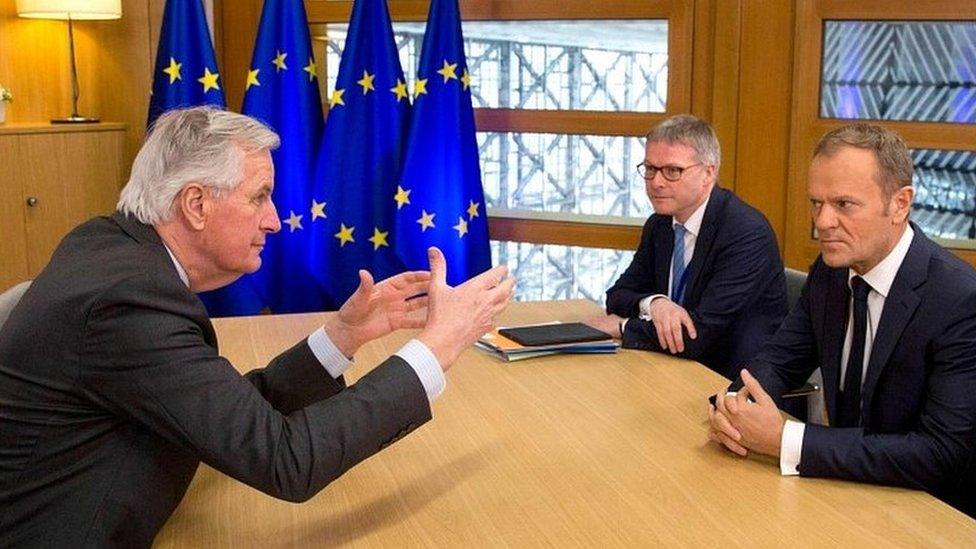Brexit: Brussels picks up the pace as paperwork mounts
- Published

EU negotiator Michel Barnier (left) has repeatedly said the clock is ticking for the negotiations
The tempo is picking up around the Brexit negotiations ahead of next week's summit of EU leaders.
"Nine days left. Stay tuned," tweeted Germany's Brexit co-ordinator.
Much of the work is the painstaking rewriting of documents.
Officials from the remaining 27 countries have been locked in epically-long meetings, revising the first draft of the Brexit treaty published by the European Commission on 28 February.
A lot of the activity has focused on the section dealing with the transition period, which the government calls the "implementation phase".
'Good faith clause'
Diplomats have added a "good faith" clause at the request of the UK. It will commit both sides to respecting each others' interests during the period.
The EU will also make a pledge that the UK should be treated as fairly as a member state during that time.
There are some technical tweaks to the section on the European Investment Bank, more specifics about how the UK will be consulted over foreign policy decisions and clarification of how London will be involved in the allocation of fishing quotas.
Although it is not clear that Britain will get the consultation mechanism for new rules and regulations generated in Brussels during the transition period that it wants.
The EU27 have been unimpressed by the UK's proposal that EU nationals coming to Britain after Brexit Day will receive fewer rights than EU nationals who arrived beforehand.
It also sounds as if the end-point will stay as 31 December 2020, which is shorter than Theresa May had suggested.
But some countries think there should be some flexibility about the date to cater for unforeseen circumstances and this could end up somewhere in the text.
The document could change again before it's signed off by the EU. It will then be shared with the UK and officially become part of the negotiations.
Future relationship
That's the divorce deal. The other paper floating around Brussels is the European Council's draft guidelines for the talks over the future relationship - the blueprint for the next phase of talks.
This has been tweaked too. The description of the future trade deal has been upgraded to a "balanced, ambitious and wide-ranging free trade agreement".
A line about the UK not being allowed to participate in the EU's agencies has been redrafted to make clear it refers to participation "in the decision-making" of those agencies, which some will interpret as clearing the way to the associate membership sketched out by the prime minister in her Mansion House speech.
But the paragraph about "the negative economic consequences" of Brexit has been amended to specify that the UK will be the side that suffers most.
And the section that glaringly omits financial services from the future relationship now mentions them - but only to say that the EU will seek to protect its financial stability and regulatory regime.
This document could change again too.
It's difficult to sum up the alterations as wins or losses for the UK or a hardening or softening of the EU position but it is more proof of the bureaucratic give-and-take going on behind closed doors.
- Published13 March 2018